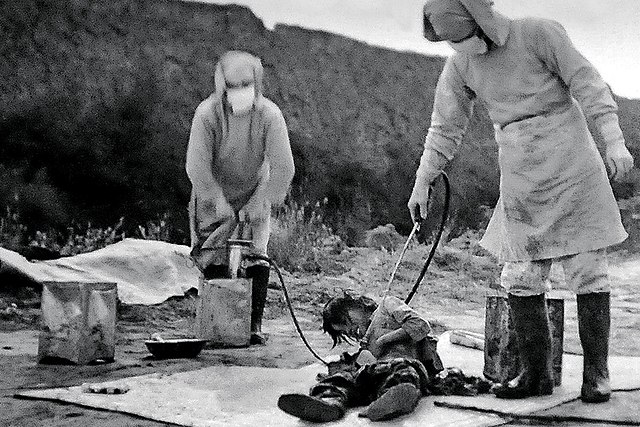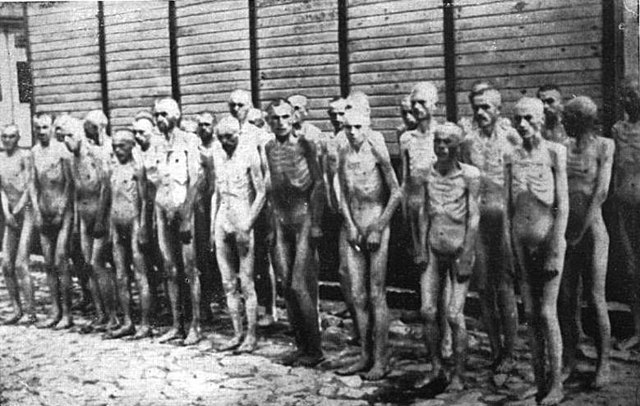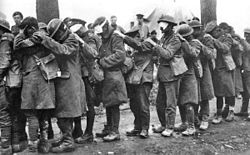War crime
individual act constituting a serious violation of the laws of war From Wikipedia, the free encyclopedia
Remove ads
A war crime is a crime that breaks international laws of war. These laws say what is allowed during war and what is not. Today, these international laws are the Geneva Conventions and the Hague Convention.

Definition
To be a war crime, a crime must be part of a plan or has to be committed against protected persons and must be committed during a war.[1]
International armed conflicts
In international armed conflicts, only prisoners of war, wounded and sick enemy fighters, shipwrecked survivors, and enemy civilians are protected persons. Nationals under their own authority as well as neutral civilians living in a belligerent state and allied citizens as long their states maintain diplomatic relations with a belligerent power are not protected persons under the law of war in the same conflicts.[2]
Non-international armed conflicts
In non-international armed conflicts, persons not taking part in hostilities are protected regardless of nationality.[2] The idea of what a "war crime" is has changed over time. For example, in the 1940s, the strategic bombing during World War II was not a war crime. But if such a bombing were to be done today, it would be a war crime.
International Criminal Court
In 2002, the International Criminal Court (ICC) was created. Its goal is to look into and, if possible, punish people for war crimes. When the ICC was created, it came up with a longer list of war crimes. Its list was the first to include types of sexual abuse like forcing women into sexual slavery.[3]pp. 8–10
Remove ads
Types of war crimes
Here are some examples of crimes that the ICC lists as war crimes.[3]
General war crimes




These are war crimes whether they are committed against enemy soldiers or protected civilians or neutral persons.[3][4]
- Torture
- Taking hostages
- Destroying or stealing property
- Willful attacks on neutral persons, property, or territory
- Doing medical experiments on a person that will hurt them
- Causing "great suffering" (severe physical or mental pain) on purpose
- Keeping a person in jail, sentencing them, or executing them without a trial
- Using chemical weapons, biological weapons, or other weapons that are illegal under international law
Sexual war crimes
These are war crimes whether they are committed against enemy soldiers or protected civilians or neutral persons.[3]
- Rape
- Sexual slavery
- Forcing a person to get sterilized
- Forcing a woman to get pregnant
- Forcing a person to be a prostitute
- Sexual violence, including all other types of sexual abuse
War crimes against protected civilians
War crimes against protected civilians include:[3]
- Forcing protected children to become soldiers
- Forcing protected civilians to leave their home countries
- Starving protected civilians on purpose, as a way of making war
- Attacking protected civilians, killing them, or destroying their property
- Making an attack that is obviously going to kill and injure many protected civilians
- Attacking places like religious buildings, schools, and hospitals, which have nothing to do with war
- Mutilating a protected civilian, e.g. by cutting off an arm or hurting them in other ways that will show forever
War crimes against enemy soldiers
War crimes against enemy soldiers include:[3]
- Killing prisoners of war
- Hurting or killing a person who has surrendered
- Hurting or killing a person who is clearly a military medic or a chaplain
- Tricking enemy soldiers by using a flag to signal a truce, then attacking
- Hurting or killing a person who is unable to fight, e.g. because they are injured or sick
- Using flags, insignia, or uniforms worn by enemy soldiers or the United Nations as a disguise while attacking
War crimes against neutral persons
War crimes against neutral persons include:[4]
- Hurting or killing a person who is a peacekeeper
- Hurting or killing a person whose country is not participating in an armed conflict, e.g. a neutral warship in belligerent waters
Remove ads
Examples of war crimes
This table shows some examples of war crimes.
Remove ads
Photo gallery
- The destroyed Belgian city of Leuven in 1915 by German occupation troops
- British troops blinded by poison gas during the Battle of Estaires
- Mass grave of Polish officers killed in the massacre at Katyn Forest
- Seamen at Kaneohe Naval Air Station decorate the graves of their fellow neutral sailors killed at Pearl Harbor
- Lidice massacre in 1942 after its destruction by the Nazis
- Bits of tattered clothing, sandals and slippers are examined by Vietnamese women who lost relatives in the 1968 Huế massacre
- Iranian victims of the Iraqi chemical attack on Sardasht
- A Sudanese family sitting in a refugee camp
- Some countries (red on this map) have not agreed to be part of the ICC. This makes it harder for the ICC to punish war crimes in those countries
Remove ads
Related pages
References
Wikiwand - on
Seamless Wikipedia browsing. On steroids.
Remove ads











